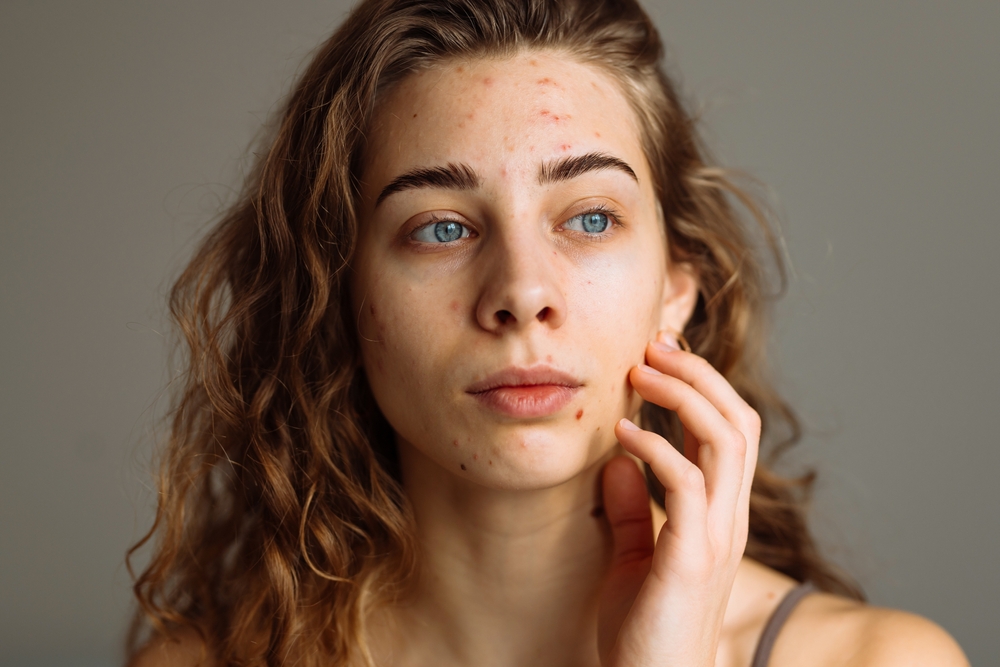Acne Vulgaris (AV) tends to be overlooked by medical researchers as a trivial and self-limiting condition, yet the psychological toll it takes on those affected can be considerable. A review of 13 studies uncovers the physical and mental scars it leaves behind, demonstrating the need for early and effective treatments.
Acne’s psychosocial impacts
Acne is often dismissed as an awkward yet near universal rite of passage, with up to 85% of adolescents and two-thirds of adults affected at some point.
Yet its psychological impacts should not be underestimated. As one 32-year-old woman interviewed by researchers said: “It’s low self-esteem, and your confidence is lacking. You do tend to feel pretty down in your life, and it’s hard to search for things to make you feel good and confident about yourself.”
In How Acne Bumps Cause the Blues: The Influence of Acne Vulgaris on Self-Esteem, published in the International Journal of Women’s Dermatology vol 4 issue 1 in March 2018, dermatologists S.M. Gallitano MD and D.S Berson MD review 13 studies that use a range of metrics and methods to assess self-esteem.
They span 11 countries and all age groups to give a fascinating overview of the psychological impact of this disease, which affects 650m people worldwide.
The review finds that acne’s negative psychosocial consequences are many, varied and sometimes severe.
It is associated with depression, anxiety, failure to thrive at school, higher rates of unemployment, lower attractiveness, and even suicidal ideation and attempts.
And underlying many of these issues is low self-esteem, with women and those with severe acne especially affected.
Here are some of the review’s key findings.
Acne’s impact by age
The knock to self-esteem is felt across ages, starting from the emotionally volatile period of adolescence.
The review’s authors write: “The adolescent stage corresponds to a life stage during which the development of core ideology related to body image, sexuality, self-image, socialization, and vocational choices begins. The changes in hormone levels that are partially responsible for AV also lead to psychological vulnerability in this age group.”
Such effects may be exacerbated by bullying, teasing and stigmatisation.
One piece of research, carried out among middle school children in South Korea, found the younger the acne began, the greater the impact.
However, a separate study in Greece discovered that acne had a significantly greater impact on quality of life in students aged 14.1-6.4 compared with those aged 11-14 and 16.5-17.5. The review’s authors suggest this is an age when school bullying is at its worst, yet family relationships no longer act as social buffers.
While acne often strikes younger people, it can also have a profound impact on older adults, with the blow to their self-esteem potentially affecting their employment and social functioning. Their feelings of attractiveness can also take a hit, and may be compounded by the ageing process.
Severity of acne
Unsurprisingly, perhaps, there was consensus that greater severity of acne is associated with lower self-esteem.
One study, where severity was assessed objectively by medics, found that embarrassment and decreased self-esteem affected almost 90% of patients with severe acne. These patients also recorded significantly worse responses to all questions about quality of life.
Other studies asked patients to rate their acne themselves, and also recorded that those with more severe conditions suffered lower self-esteem.
Acne’s impact by gender
There was broad consensus that women were more affected by the disease: they tended to suffer greater self-consciousness, self-perceived stress, lower self-esteem, and poorer body satisfaction than men, as well as greater feelings of uselessness.
The review’s authors highlight that in western culture, women are expected to have clear skin to be considered beautiful and successful – but pressure is growing on men to reach similar beauty standards.
Of the 13 studies, however, four showed that men and women were equally affected, while one from Egypt found that male patients had significantly lower self-esteem. Drs Gallitano and Berson suggest this could be attributed to the higher social visibility of men than women in that country.
Treating acne to enhance self-esteem
Clearly, it’s crucial to boost patients’ self-esteem by treating acne before it can cause lasting psychological damage.
Yet while 70-80% of patients used self-prescribed topical treatments, only 5-28% saw dermatologists. One study found they took an average of almost two years to seek medical help.
Drs Gallitano and Berson write: “Effective treatment improves patients’ self-esteem, and as dermatologists we have an armamentarium of treatment options to improve AV.”
Very soon, we at Arctic Therapies are confident that our AT-004 treatment will be transforming the treatment regime that dermatologists can offer their patients, enhancing quality of life and self-esteem for patients globally. Find out more about our AT-004 treatment for inflammatory skin disease.

